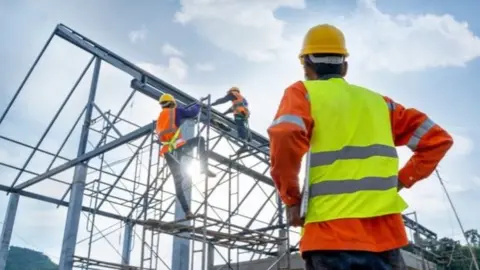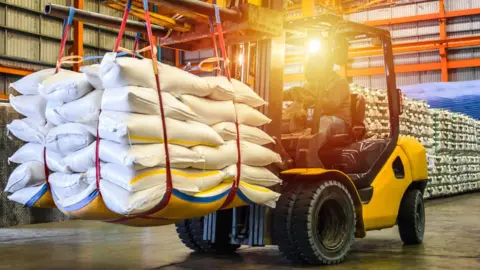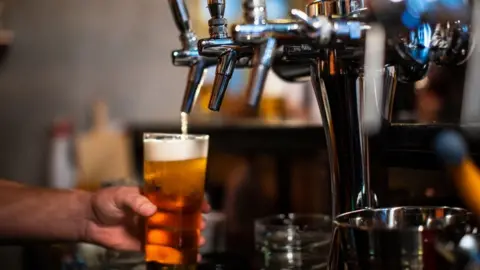Coronavirus: How will NI companies adapt to post-lockdown 'normal'?
 Getty Images
Getty ImagesBusinesses in Northern Ireland are beginning to think about how to operate after the lockdown ends.
But there is a growing realisation that there will be no return to normality in the immediate future.
First Minister Arlene Foster has raised the prospect Northern Ireland could come out of lockdown earlier than the worst-hit areas of the UK.
But she was clear about what that means in practice.
"We must all face the reality that when the initial threat recedes and the first wave of this pandemic is over, it will not be business as usual.
"Everyone in a position of responsibility in the public and private sectors needs to prepare for a new normal."
'Work together'
Across different sectors of the economy, that new normal is starting to drift into focus.
 Getty Images
Getty ImagesIt is one where efficiency will have to take a distant second place to safety.
It will mean significant changes to some operating procedures, and may make it hard for some businesses to continue trading.
The Construction Employers Federation (CEF) has advised its members not to rush back to work, but instead use the lockdown period to "completely understand" the latest safe operating procedures.
That includes a whole list of measures - ranging from travel to work and site meetings to canteen facilities and use of lifts.
The upshot of all this is that everything is going to need more planning, take more time and, consequently, be more expensive.
"There will be issues around additional costs arising out of these changes in the way we work," said CEF managing director John Armstrong.
"And there is no doubt that the way we work will change - and will change for some time. So what we're urging is that contractors and clients work together.
"We are urging the clients, in particular, to be empathetic and sympathetic to contractors to ensure that these issues can be overcome in a pragmatic and a sensible way."
In the manufacturing sector, there was a warning this week that a return to work could still be accompanied by redundancies.
Life after furlough
Millions of workers across the UK are currently furloughed - not at work but with the government paying 80% of their normal wages, up to a limit of £2,500.
That scheme is due to last until the end of June.
The intention is that businesses and their employees are protected until economic conditions become more normal.
But what if the world has moved on by then?
 Getty Images
Getty ImagesManufacturing companies, particularly engineering firms, are often part of long and complex global supply chains.
The risk for them is that they could find themselves replaced by companies in places such as Germany, Austria and South Korea which have been able to reopen earlier.
Manufacturing NI, the lobby group, said: "Furlough is a replacement for redundancy for now, not for ever.
"With four out of five of our firms using cash from the business to sustain operations now, they really need to be supported in getting back safely to business."
This fear that furlough may only delay redundancies was echoed in a paper published by the National Institute for Economic & Social Research.
In it, the economists Danny Blanchflower and David Bell write that furloughed workers will only have jobs to go back to if their companies are solvent, and have markets to sell into.
"This becomes a tougher call the longer the lockdown persists."

- A SIMPLE GUIDE: How do I protect myself?
- AVOIDING CONTACT: The rules on self-isolation and exercise
- HOPE AND LOSS: Your coronavirus stories
- LOOK-UP TOOL: Check cases in your area
- VIDEO: The 20-second hand wash
- STRESS: How to look after your mental health

It is the hospitality industry which realistically faces the longest lockdown period as by its nature it involves bringing people together in close proximity.
This week, the prominent Belfast publican Willie Jack had a go at trying to imagine how to get out of lockdown.
He talked about:
- Using as much outside space as possible
- Preventing people from congregating at the bar
- Keeping tables spaced and groups small
That would be a very different sort of pub experience and one which would involve a significantly smaller number of customers.
Christmas drinks?
So the industry thinks that ongoing government support will be necessary.
"A business can't reopen and just lose money every day, it will go bust very quickly," said Colin Neill of Hospitality Ulster.
"So it's about bringing down the taxes, the rates, all of those."
"And if we can even get up and running and break even, that does bring a degree of normality back."
But with the UK's chief medical officer warning that we will have to live with some disruptive social measures for at least the rest of the year, it seems optimistic to imagine that any of us will be meeting for Christmas drinks.
